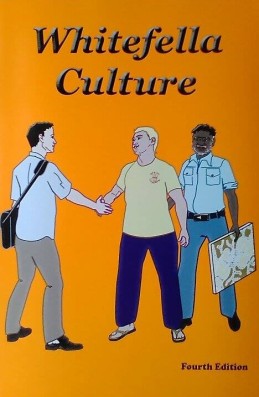Wyld Woman Goes Bush
Seeking hidden doorways to realities that urge us to awaken from the trance of the mundane world and discover the truth of our Inner Self.
Summing up Cultural Differences
In two previous blogs I mentioned a book that shares the cultural differences and social norms between whitefella and Australian Aboriginal culture. In this blog I wanted to mention a few of these, but most importantly sum them all up in one place so you, the reader, can understand better.
(Please note: There are more interesting norms in the book. This is only a summary).
#1 Being Friendly – Whitefellas greet people and ask for their name. Aboriginal people don’t like to hurry into meeting new people and asking for someone’s name is rude. Aboriginal people often won’t talk much and whitefellas should not feel bad about that or think the Aboriginal person doesn’t like them. This is just a cultural difference.
#2 Asking for Help – When a whitefella asks a question or asks for help an Aboriginal person might think he is accusing them. But sometimes the whitefella just wants to know something or just wants help. In Aboriginal culture it’s important not to push yourself into other people’s business. An Aboriginal person will not help until they are invited to do so; whereas whitefellas usually help without asking.
#3 Answering Questions – White people ask a lot of questions. They often ask questions that expect a ‘yes’ or ‘no’ answer. And white people often want straight out answers. Aboriginal people don’t ask so many questions, especially direct questions. They find out by watching and listening or by asking in roundabout ways. And Aboriginal people don’t usually ask questions that ask about two different things, questions about ‘this or that’. They will probably just say ‘yes’ to that kind of question because it can be very rude in Aboriginal culture to say a straight out ‘no’.
#4 Money – Aboriginal people are taught as children that they must give things to their relations. Giving and asking is an important part of being family. In whitefella culture they are taught as children to be careful with their money. They think about what to do with that money and what they will need to buy. Whitefellas can usually make money last because they don’t have lots of relations to give it to.
#5 Being Friends – In Aboriginal culture family relations are most important. They help their relations all the time. In white culture, people are more careful about their time and how much they give – or not at all. Whitefellas also have differences between work and family – when they are doing work they are not supposed to treat their family any better than any other customer.
#6 – Good Manners – It’s important in white culture to be friendly when you meet people. You shake hands, make eye contact and ask for their name and might say something like, ‘Glad to meet you’. If you look at the floor when meeting someone it’s considered rude. In Aboriginal culture it’s not polite to look directly at someone while talking, it’s not polite to ask for their name. Aboriginal people take time getting to know someone and they find it rude and pushy the way white people show friendliness.
#7 – Looking After Things – In white culture people teach their children to look after things – especially expensive things because they know how much they have to work to get those. In Aboriginal culture children are taught o share with their relations and that it’s important to give things to your relations – this keeps the relationship strong. Sometimes relations ask to borrow expensive things and don’t look after it.
I found this little book very handy and I hope that by sharing some of this valuable advice and information that we can form a stronger connection between whitefellas and the Australian Aboriginal culture. It is printed by the Australian Society for Indigenous Languages, 2008.

